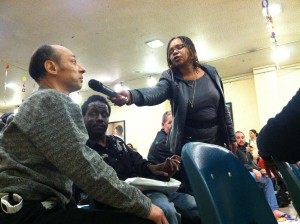
It's been almost five years since San Francisco launched its innovative, universal health plan--Healthy San Francisco--and last night a panel of public health experts and care providers gathered at the Tenderloin's Glide Foundation to provide a snapshot of how the program is faring.
Glide has a long history of providing services to the poor and marginalized--and advocating on their behalf. Glide's Freedom Hall was packed, with a smattering of people who indicated they were participants in Healthy San Francisco. Tangerine Brigham, director of the program, spoke first and described the program's goals: to provide improved access to care through a network of community clinics and hospitals. Of primary importance is for people to have a relationship with a doctor or clinic so they don't resort to the emergency room for what are essentially primary care problems.
Since its inception in 2007, Healthy San Francisco has enrolled 80 percent of San Francisco's uninsured--about 55,000 adults. And people are using the primary care benefits. "Over 70 percent of the people in Healthy SF are getting a primary care visit at least once a year," Brigham said. "Because they're using primary care, we saw a reduction in emergency room utilization at San Francisco General Hospital. We compared that to other public hospitals in California and what that analysis showed was that San Francisco emergency utilization was declining while others' was rising."
Healthy San Francisco is not health insurance. Participants pay a quarterly fee--on a sliding scale--for care at the clinics and hospitals that participate in the program, which are in San Francisco only. But people don't seem to be bothered by the geographic constraints. A 2009 survey by the Kaiser Family Foundation found that 94 percent of participants were at least "somewhat satisfied" with the program and 92 percent would recommend to a friend.
Karen Hill is the clinic manager at Glide Health Services. As a provider, she is also highly satisfied with Healthy San Francisco. "From a clinic manager's perspective," she says, "I don't have to worry about where I need to send someone for specialty care. I know they have a place to go. ... We are going to be able to get those specialty tests they need. We have access for blood tests and for medications."